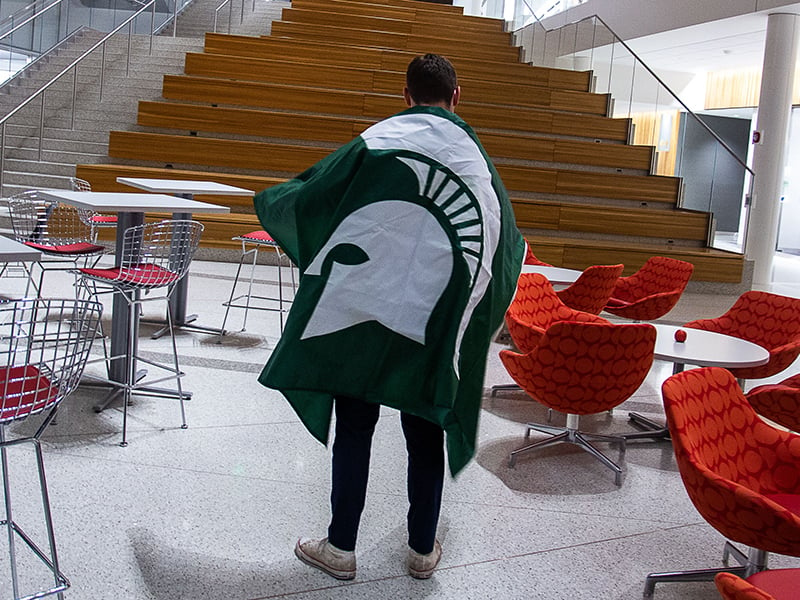Feature: MSU Produces Entrepreneurs and Promotes Entrepreneurship

One remedy for an ailing economy is entrepreneurship, and MSU helps advance the cause through education, centers, institutes and business partnerships.
On a recent cold blustery day on campus you could almost smell suntan lotion and spring break in the air. Maybe, it’s the lingering influence of MSU Professor Glendon Swarthout’s book-movie Where the Boys Are (1960), which launched college spring break 50 years ago, but inside Case Hall a dozen MSU juniors and seniors were plotting an entirely different spring break scenario.
The men and women of the Applied Public Policy Research Seminar were planning their spring trip itinerary to “where the entrepreneurs are.” The students will spend their spring break studying the entrepreneurial culture in such hot spots as Charleston, SC, Pittsburg, PA and Raleigh, NC. There is no Daytona Beach, Miami Beach or Ft. Lauderdale on the trip and it’s unlikely they will need any suntan lotion.
The unusual class taught by Professor Ross Emmett and Associate Professor Bryan Ritchie of James Madison College has been spending the semester exploring what type of social and cultural policy it takes to create the next generation of entrepreneurs in Michigan. It’s not that MSU doesn’t have bragging rights about the entrepreneurs it has already turned out. The likes housing developers Eli Broad, ’54, founder of two Fortune 500 companies, and Joel Ferguson, ’65, chairperson of the MSU Board of Trustees (who by the way was looking at how to build a “cool city” environ 20 years ago); Bob Fish, ’88, co-founder and CEO of Biggby’s, a Lansing-based coffee chain; retail mortgage giant Dan Gilbert, ’83, CEO of Quicken Loans; Richard Golden, ’70, founder of D.O.C. Eyeglasses; Peter Secchia, ’63, of Michigan Forest Products; and Mary Ellen Sheets, who turned $350 into the moving giant Two Men And A Truck, are just a few who have helped create new enterprises that have impacted the Michigan economy.
In addition, many alumni have enjoyed entrepreneurial success outside of Michigan—such as Michael Budman, ’68, and Don Green, who founded Roots, the giant Canadian lifestyle company; Andy Hildebrand, ’69, who revolutionized the oil exploration industry and pop music (see profile, p. __); Kay Koplovitz, M.A. ’68, founder of USA Network; Drayton McLane, MBA ’59, chairman of McLane Group and chairman and CEO of the Houston Astros; and desktop publishing pioneer James Von Ehr, ’72, founder and CEO of Zyvex Corp., the nation’s first molecular nanotechnology company.
The state is peppered with MSU alumni who have set out on their own creating businesses, both large and small.
But today there is a new motivation. Michigan’s economy is no longer being driven by monolithic employers, but rather by thousands of new economy companies headed by relentless entrepreneurs.
President Lou Anna K. Simon, recognizing this economic tsunami, made sure that entrepreneurism was an integral part of her “Boldness by Design” initiative. She understands that to be successful Michigan must think globally, but also act locally. To make sure this became institutionalized she helped launch the Prima Civitas Foundation. It is headed by David Hollister, ’64, M.A. ’69, former mayor of Lansing, state legislator and director of the State Dept. of Labor and Economic Growth. The foundation’s goal is to help create the jobs for Michigan’s future and foster a culture of innovation and entrepreneurship in Mid-Michigan.
Buoyed by major grants from the Mott Foundation and a $15 million grant from the U.S. Dept. of Labor, Hollister and Prima Civitas—“First State” in Latin—aim to establish a program that would facilitate transfer of intellectual property from MSU, establish collaborative ties between economic agencies in mid-Michigan, and help create an entrepreneurial state.
Hollister notes that creating an entrepreneurial culture in Michigan is not an overnight task. “It will take a generation,” he estimates.
For starters, Hollister believes the state needs to change its attitude toward entrepreneurial activity. “In Michigan, we look at an entrepreneur who has failed with a jaundiced eye while on the West Coast failure is a measure of success,” he notes. “We have to bring that attitude to Michigan where we look to these risk-takers for advice.”
He points out that highly successful development agencies across the country have directors who are leaders in the business community, and accordingly, the Prima Civitas Board of Directors follows that pattern of success.
“We have to institutionalize a culture change that involves everything from changing curriculum, establishing mentorship programs, assuring advanced degrees, and establishing business incubators,” Hollister says.
Beyond classes like the one in James Madison College, now in its fourth year, which the students have dubbed “Michigan Futures,” and partnerships like Prima Civitas, the Institute for Entrepreneurship in the Eli Broad College of Business is also making a difference in the classroom and across mid-Michigan. The institute focuses on teaching the practical aspects of entrepreneurship—including how to write a business plan to attract capital and how to navigate the complex world of venture capital and financing.
Roger Calantone, director of Broad’s Institute for Entrepreneurship, says the more than a dozen entrepreneurship courses offered by the college attract hundreds of students a year. “There is some excitement, and some jazz, and three student-led organizations promoting entrepreneurship have started,” he says.
In addition, he notes, some students are currently working on a launch of their own businesses—“spinning opportunities out of tragedy,” in his words.
Calantone believes that the Michigan economy was on “its way to the tipping point” when the current economic crisis struck, but he is optimistic about the future.
“That’s one advantage of teaching youth—they have no fear of failure,” he says.
“The Broad College teaches some basic skills that every entrepreneur should have, including identifying markets and customers, law, accounting and finance in addition to writing that business plan which will attract financing.”
Calantone has an interesting take on the question of whether entrepreneurs are born or made. “Entrepreneurs are made,” he says emphatically. “Growing up in an entrepreneurial family makes you feel like you were born an entrepreneur.”
What he likes most about teaching entrepreneurship courses in Broad is the turnover of students every few years. “They are young, renewed and an open book,” he says. He calls entrepreneurship the “height of democracy.” As he explains, “People own the means of production. We want people to leave here with the knowledge to start their own business, and then it’s up to them.”
Also within the Broad College of Business, The School of Hospitality Business is planning an entrepreneurship specialization. “We have many graduates who are very successful entrepreneurs, like Hans Schuler, Bill Zehnder, Judy Zehnder Keller, Herman Berghoff, and Hugh Andrews,” says Ron Cichy, the school’s director. “We want to formalize the process by which you become an entrepreneur.” There is also an entrepreneurship course in the retailing program in the College of Communication Arts & Sciences.
MSU’s thrust at upping the ante for entrepreneurism also includes the Product Center for Agriculture and Natural Resources, which works with agricultural-related products to bring them to market. They consult with operations as varied as a turkey ranch to small businesses like the Sweetie-Licious bakery in DeWitt.
Operated by Linda Hundt, the bakery turned to the Product Center for help in taking her Crisco National Pie Championship award-winning pies from its local market to a global, internet market. The center helped Hundt develop successful marketing strategies along with the packaging needed to ship frozen pies.
Hollister, the students and others recognize that business start-ups come in all sizes from small bakeries to gigantic concerns like Quicken Loan. They also believe that an entrepreneurial culture will be buoyed by the location of both the $550 million Facility for Rare Isotope Beam (FRIB) and a new, specialized IBM center on the MSU campus. Hollister, who was noted for his collaborative politics as a legislator, says he intends to challenge area colleges and universities to build networks and work together.
To that end, President Simon also restructured the university’s Intellectual Property Office to increase the focus on commercialization and created the economic development engine Rational Siting Push-Pull Accelerator (RSPPA), which is using grants to launch and develop start-ups. Hollister says these efforts put Michigan in position to take advantage of MSU strengths such as biotechnology and agriculture.
“The goal is to use our universities as engines of economic growth,” he notes, hastening to add, “We are in the very early stages.”
Hollister says the environment needs to include a support network for entrepreneurs, including access to venture capital, incubators, and most importantly, a social network for budding entrepreneurs. Prima Civitas and MSU are helping to provide that environment by hosting forums for venture capital angels and entrepreneurs and assisting the RSPPA in locating internships for students to pursue entrepreneurial activities.
Also helping this effort are MSU graduates such as Jim Epolito, ’78, an executive with Delta Dental who served as the director of the Michigan Economic Development Corporation. He was recently succeeded at MEDC by another MSU alumnus, Greg Means. Just down the street Tim Daman, ’90, directs the Greater Lansing Area Chamber of Commerce.
Hollister says Michigan has to be bold and consider measures like forgiving student loans for entrepreneurs who start a business in Michigan.
The students in Professors Emmet’s and Ritchie’s class couldn’t agree more. The class, which is run in an entrepreneurial mode—free form without a syllabus or books—is in its fourth year. The class has worked to identify the characteristics which every entrepreneurial activity entails—creativity, risk taking and adaptability.
One student notes, however, that items such as tax structure, the cost of doing business in Michigan and wages are not out of the norm when compared to other states. “We didn’t score that poorly,” he says. “We want to identify the reason entrepreneurship is inhibited in the state.”
The students and Hollister agree that part of the solution is to encourage the K-12 educational system focus more on creative problem solving. The students also believe that the sense of entrepreneurship has to reach down into families with parents talking about starting businesses as an alternative to traditional jobs. The students say most parents are only concerned about their children landing a job.
MSU Extension has actually taken some steps to cultivate entrepreneurship in the younger generations and within communities. Extension has statewide initiatives to grow business and entrepreneur 4-H Clubs for youth and afterschool programs, including curricular resources and training programs. At the same time, a group of MSU Extension economic developers are working to provide resources, networking and expertise to help communities across the state become better havens for entrepreneurs.
Barbara Fails, director of rural entrepreneurship for the College of Agriculture and Natural Resources, who has organized an informal university-wide faculty interest group around entrepreneurship, is encouraged by the changes she has seen already. “In so many ways, we are empowering and connecting people to nurture entrepreneurship as a way to secure Michigan’s prosperity,” she says.
Using Facebook, the social networking site, the James Madison students are probing other students on campus about why they are leaving Michigan. “They are telling us the same old preconceived notions about Michigan’s economy,” says one student involved with this research. “Most students don’t even bother to look here (in Michigan).” Both the students and Hollister, who regularly attends the classes, have concluded that the attitudes toward entrepreneurship in Michigan are in serious need of overhaul.
The students are also pursuing how they can apply entrepreneurial skills to non-profit agencies and within business and government. They also have questioned what they call Michigan’s citizens sense of entitlement about a job—that “we” are owed a job.
When asked if the class was a life-changing experience, everyone in the class raised their hands. One senior says, “We hope we can also change other people’s lives.”
From what they have learned so far, they have some advice for Michigan which includes: creating an atmosphere of advocacy versus bureaucracy; being more flexible in approaches toward new business; removing the sense of job entitlement in Michigan and finally assuring that entrepreneurship has a “higher platform and a bigger megaphone.”
Whatever the case, many things—ideas, energy, actual relationships and partnerships—are percolating throughout MSU that will in the end impact positively on sparking entrepreneurship to help counteract the state’s economic woes.
? Bill Castanier, ’73, is the literary reviewer for Lansing’s City Pulse weekly newspaper and also writes mittenlit.com, a literary blog on Michigan books and authors.

